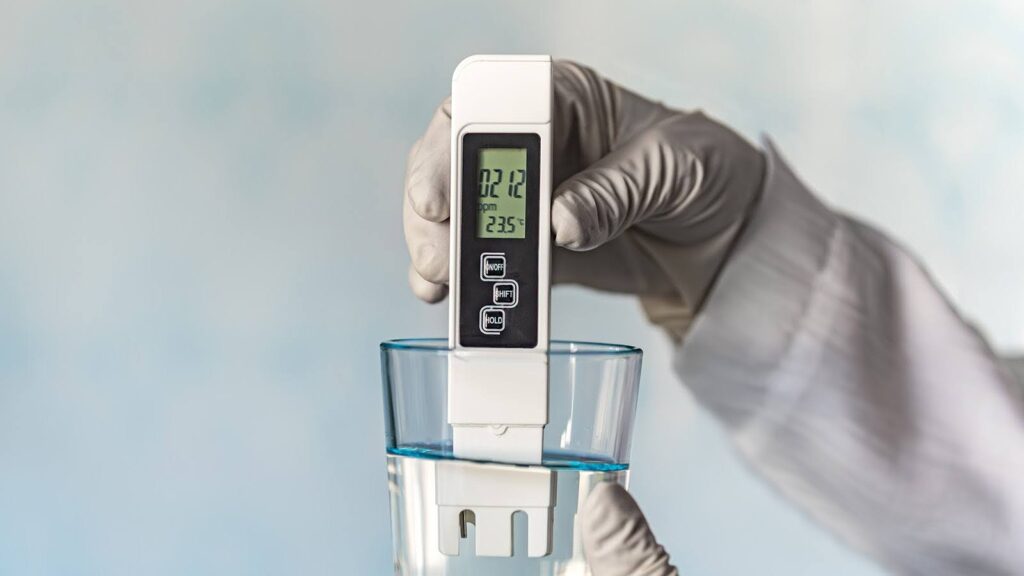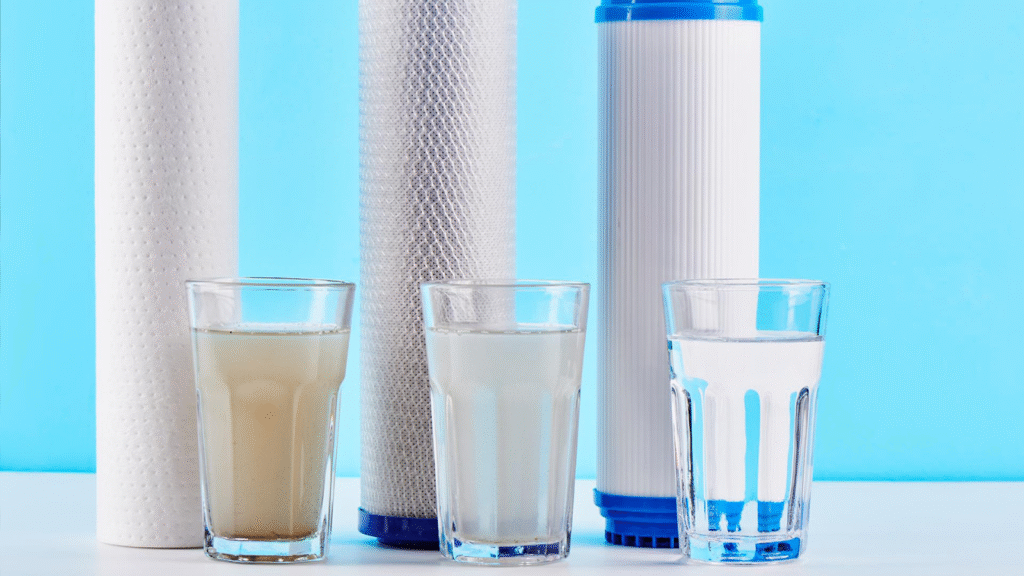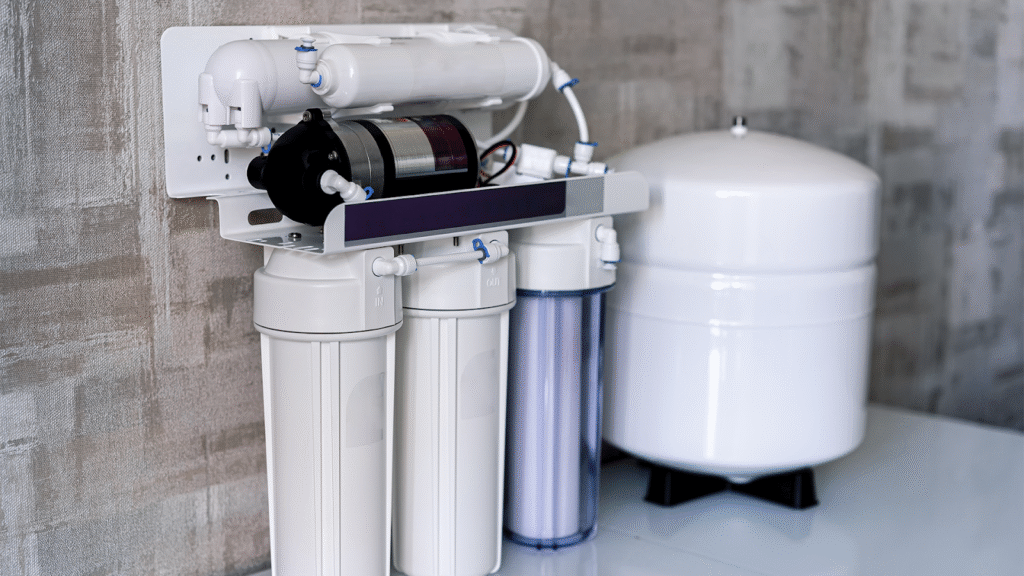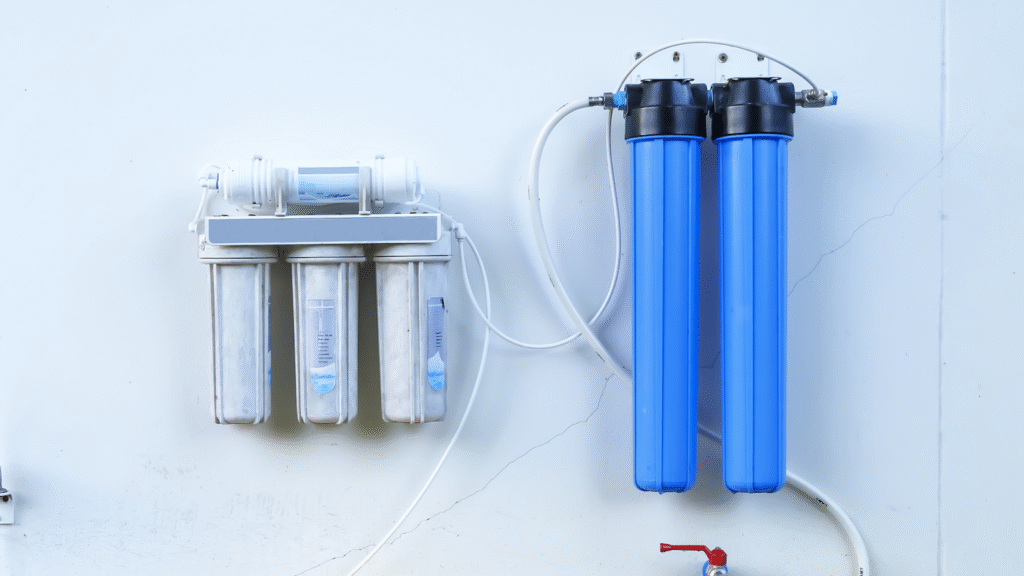Did you know the quality of your water can impact your energy bills? Hard water can indeed cause your home’s heating system to work harder, resulting in higher energy costs.
In this article, we’ll explain how using a water softener in Edmonton can lead to significant energy savings. By keeping your appliances efficient and reducing waste, soft water benefits not only your home but also your wallet and the environment.

Table of Contents
ToggleHard Water is Hidden Energy Waste
When people think of saving energy at home, they often think of turning off lights or upgrading insulation. But one often overlooked factor is water hardness. Edmonton’s hard water can cause a lot of indirect energy waste through its effects on appliances:
- Water Heater Strain: Your hot water tank or tankless heater is a major energy user. Hard water’s minerals accumulate as limescale inside the heater. This scale essentially coats the heating element or the inner walls of the tank with a rock-hard layer. It’s like putting a jacket on the heater’s element – it has to work much harder (using more gas or electricity) to heat the water through that insulating crust. Even a thin layer of scale (just a couple of millimeters) can drastically reduce the heat transfer efficiency. Over time, as scale builds up, your heater might run longer and longer for the same hot water output, guzzling energy. The energy waste can be significant – studies show that hard water scale can lead to double-digit percentage losses in heating efficiency. Learn more about how different water softener technologies can tackle scale buildup.
- Longer Appliance Cycles: Hard water can cause appliances like dishwashers and washing machines to underperform, meaning you may unconsciously compensate by running longer cycles or higher temperature settings. For example, if your dishwasher isn’t cleaning well due to scale and mineral interference, you might start using the “pots and pans” intense cycle every time (which uses more hot water and electricity) or re-wash items, doubling the energy and water use. Similarly, in laundry, mineral-laden water might not get clothes as clean in cold water, so you opt for warm or hot washes, which consume more energy. All of this creeping increase in cycle intensity adds to your utility bills. Discover the benefits of salt-based vs salt-free water softeners and how they impact efficiency.
- HVAC Humidifiers and Other Systems: Many Edmonton homes have furnace humidifiers, which add moisture to the air in winter. These often have water pans or pads that can crust up with hard water deposits. A scaled-up humidifier pad won’t evaporate water efficiently, forcing the unit to run longer to maintain humidity, which in turn can make your furnace work harder to distribute that humidity. It’s a small thing, but every inefficiency can ripple into higher energy use. In contrast, soft water minimizes these deposits, so even peripheral systems run smoothly.
In short, hard water often makes your home’s systems less efficient than advertised, leading to higher energy consumption behind the scenes.
Soft Water Keeps Your Water Heater Efficient
Let’s zero in on the water heater, since it’s often the single biggest source of hot water energy use in the home. Whether you have a traditional tank or a tankless system, soft water can drastically improve its efficiency:
- Maintaining Heat Transfer: Without hard water minerals, there’s nothing to form insulating scale on heating elements or tank walls. This means your water heater can transfer heat to the water directly and effectively, just as it was designed to do. It doesn’t have to run longer or at a higher flame to get the job done. The result is that a water heater on soft water maintains its peak efficiency year after year. Imagine a 40-gallon gas water heater – in Edmonton’s hard water, it might start at ~70% efficiency (typical for new units) but drop to the mid-60s or lower over a couple of years due to scale. With soft water, that same unit could stay at ~70% for its lifespan. That difference – say 5-10% efficiency loss avoided – directly translates to 5-10% less energy used to heat your water each year. View details on dual-tank water softeners for large households, which help maintain steady efficiency in high-demand homes.
- Faster Heating, Less Standby Loss: A cleaner, scale-free water heater heats water faster. That can mean the tank reaches its set temperature quicker and then shuts off, spending less time firing and refiring. Quicker heat also means less heat lost to the environment during the heating process (since the water gets to temp sooner and the burner isn’t on as long). In tankless systems, no scale means the unit can reach the target temperature quickly without maxing out its burner or electric coil capacity. In both cases, you’re getting hot water more efficiently and likely faster at the tap as well.
- Longevity and Efficiency Go Hand in Hand: As mentioned in earlier sections, soft water extends the life of the heater. An older heater in a hard water scenario might not just have scale issues – it might also have partially clogged pipes or sediment affecting sensor readings, causing inefficient cycling. Soft water prevents these age-related inefficiencies, so even an old water heater can continue to operate at a relatively efficient level until the end of its days. That means you’re deferring the energy inefficiency that usually comes with aging appliances.
To put some numbers on it, research by the Water Quality Research Foundation found that gas storage water heaters on soft water did not experience the usual efficiency drop-off seen with hard water. In hard water conditions, they observed as much as a 24% increase in energy consumption to deliver the same amount of hot water, due entirely to scale. Soft water users avoid that penalty completely.
Energy Savings in Laundry and Dishwashing
Hot water use isn’t limited to your taps and showers; a lot goes into washing machines and dishwashers. Soft water can help these appliances clean effectively at lower temperatures and with shorter cycles, which is a direct energy saver:
- Cold Water Washing Success: Typically, washing clothes in cold water saves energy (since you’re not using the water heater to supply hot water). However, in hard water, cold washes might not get clothes as clean because the minerals hinder detergent performance. People then bump the temp up to warm or hot, sacrificing energy savings to get acceptable results. With soft water, detergents work so well that even cold water washes can effectively clean your clothes. Many soft water users find they can wash in cold or tap-cool water almost all the time and still have bright, clean laundry. This means huge energy savings, especially for those frequent loads. Every time you choose cold over hot, you’re cutting the energy for that load by a significant margin.
- Shorter or Eco Cycles Work Properly: Modern dishwashers and washers have “eco” modes or shorter cycle options that are intended to save energy and water. However, these modes often assume optimal conditions – including good water quality. In hard water, an eco mode might underperform (leaving residue on dishes or not fully cleaning clothes). As a result, homeowners might avoid those settings. With soft water, the cleaning power is restored such that eco modes clean just as well as normal modes did in hard water. You can trust the shorter cycle to get the job done, thus saving energy each run. And if you’re really detail-oriented, you may find you can also skip extras like the dishwasher’s heated dry cycle, since soft water sheets off dishes more completely (less water clinging = faster air drying). Skipping the heated dry saves additional electricity.
- Less Detergent, Less Manufacturing Footprint: Another indirect energy angle – using less detergent and soaps (which you can with soft water) means less demand for those products in the market, which in turn means the energy used to produce, package, and transport them is reduced. This is a more global viewpoint, but if many households use soft water and cut detergent use by half, that’s a tangible reduction in industrial energy usage. Closer to home, it also means potentially less residue buildup in your appliances, which can help them stay efficient.
The Environmental Impact: Soft Water as a Green Choice
Saving energy isn’t just about cutting your bill – it’s also about reducing your carbon footprint. Here’s why using an efficient water softener system is an environmentally friendly decision:
- Lower Energy Consumption = Lower Emissions: Edmonton’s energy, like in many places, often comes from a mix of sources, including natural gas and coal (for electricity). When you use less gas to heat water or less electricity to run appliances, you are directly contributing to fewer greenhouse gas emissions from power plants. Over a year, the energy saved by a water softener (through all the mechanisms we discussed) could be equivalent to hundreds of kilograms of CO₂ not released into the atmosphere. It’s one of those hidden green benefits – you might not see it, but it’s happening in the background.
- Extended Appliance Life = Less Waste: By making appliances last longer, you aren’t just saving your wallet – you’re also reducing waste. Manufacturing a new water heater or washing machine has a significant environmental cost (raw materials, energy in manufacturing, shipping). The longer you can keep your existing appliances running efficiently, the fewer new units need to be produced overall. This also reduces landfill waste since you’re not discarding old units as frequently. In a way, a water softener is a tool for sustainable living because it helps you consume less and throw away less over time.
- Reduced Chemical Use: Soft water often means ditching extra-harsh cleaning chemicals. Many people find they clean their bathrooms and kitchens with gentler products (or even natural solutions like vinegar) because they’re not battling heavy scale. Fewer chemicals going down the drain is better for our rivers and water treatment systems. Similarly, using half the laundry and dish detergent means fewer phosphates or surfactants entering the wastewater. These environmental pluses, while secondary to energy, round out the eco-benefits of switching to soft water. Skipping the heated dry saves additional electricity. Find more tips on maintaining your water softener in Edmonton
Efficient Water Softener Systems – What to Look For
You might be thinking, “This sounds great, but doesn’t a water softener itself use energy and water?” Traditional softeners indeed regenerate (flush and recharge their resin beads) using water and salt, and some use electricity for the control valve. However, modern softeners are designed to be highly efficient themselves:
- Demand-Initiated Regeneration: Older softeners would regenerate on a fixed schedule (e.g., every 7 days) whether it was needed or not, which could waste water and salt. Efficient models today use demand-initiated regeneration (DIR), meaning they only recharge when the resin is actually nearing its capacity. This ensures minimal water usage, making the system more eco-friendly.
- High-Efficiency Models: Some softeners are specifically rated as high efficiency, meaning they use less salt and water per regeneration cycle by optimizing the resin design and flow patterns. When shopping, look for softeners that advertise a low salt dose per hardness removal or have certifications for efficiency. An efficient softener will typically use the absolute minimum salt needed to do the job – saving you money on salt and reducing sodium discharge slightly.
- Energy Use of Softener: The electricity a water softener uses is negligible – usually on par with a digital alarm clock (just to run the timer/control head). So the softener itself isn’t an energy hog at all. If anything, adding a softener slightly increases your home’s water use (for regeneration), but the trade-off in appliance efficiency and longevity more than makes up for that in both cost and environmental terms. Some extremely efficient households even route the regeneration discharge for greywater uses (like flushing toilets) to not waste that water, although that’s an advanced conservation step.
In summary, a well-chosen and properly sized water softener will itself be efficient and will unlock energy savings throughout your home.
Soft Water Savings: A Recap of Dollars and Cents
Let’s bring the discussion back to what you, as an Edmonton homeowner, stand to save in hard numbers:
- Lower Heating Bills: By keeping your water heater efficient, you’ll see the difference in your gas or electric bills (depending on your heater type). It’s hard to give an exact figure because it depends on your water usage and heater size, but some estimates suggest up to a 10-15% reduction in water heating energy for moderate hardness levels over time. If your annual water heating cost is, say, $500, that could mean $50-$75 saved per year right there. If your water is very hard and your heater is struggling, savings could be even more.
- Electricity Savings in Appliances: Using cold water for laundry instead of hot water would save around $0.50 per load (varies with local energy rates and washer specifics). If you do 5 loads a week, that’s $130 a year potentially. Even if only some loads can switch to cold, it’s still notable. Running a dishwasher on eco mode might save a fraction of a kWh each time – maybe $20-30 a year. These may not sound huge individually, but they stack up.
- Long-Term Avoided Costs: As mentioned under environment, not having to replace appliances or parts as often saves the energy and cost of those items. It’s hard to quantify in an annual bill, but consider: a softener might add a few dollars a month in water and salt cost, but if it prolongs the life of a $1200 water heater by, say, 5 years, that’s $1200 saved over an extended period (or $20 a month in “value” if amortized). That indirectly equates to energy/material savings as well because you get more utility out of one heater’s manufacturing energy.
When all factors are combined – direct energy savings, indirect savings, and extended lifespan benefits – using a water softener is like tightening up an inefficiency you never knew you had. It’s making your home leaner and greener without requiring you to change your habits or comfort.
Make the Smart Move with Water Softener Edmonton
Energy efficiency improvements often require significant upgrades or lifestyle changes. By contrast, installing a water softener is a relatively simple change that delivers outsized benefits quietly in the background. You’ll enjoy all the primary benefits (like cleaner dishes, softer skin, longer-lasting appliances) and the bonus of lower energy usage.
At Water Softener Edmonton, we offer a range of efficient, high-quality softeners that are optimized for performance and savings. Our systems are demand-controlled and designed to waste very little water or salt, ensuring you get the maximum benefit with minimal operating cost. Our team can guide you to a unit that matches your household size and water hardness perfectly.
If you’re interested in saving money and energy while also improving your home’s water quality, we’re here to help. Contact Water Softener Edmonton for a consultation or free water hardness test. We’ll show you how an efficient water softening system can be one of the best upgrades you make for your home’s energy profile.
Don’t let hard water quietly drain your wallet through inflated energy bills. Take action now to enjoy softer water, a more efficient home, and tangible savings that you’ll appreciate every month.




